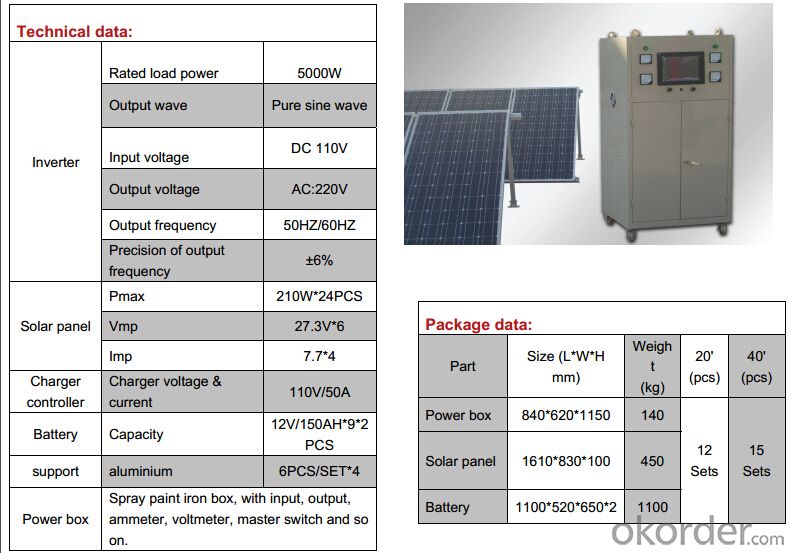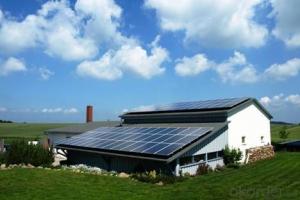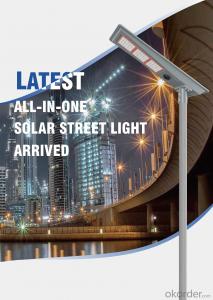Solar System 5KW Off-Grid System Long Useful Time
- Loading Port:
- Shanghai
- Payment Terms:
- TT OR LC
- Min Order Qty:
- 20 set
- Supply Capability:
- 2000 set/month
OKorder Service Pledge
Quality Product, Order Online Tracking, Timely Delivery
OKorder Financial Service
Credit Rating, Credit Services, Credit Purchasing
You Might Also Like
Item specifice
Application:
Home
Output Voltage (V):
220
Solar System 5KW Made in China Off-Grid System

Solar system advantages:
1. CE, ROHS approved.
2. High conversion efficiency, high-transmission rate.
3. Energy saving, environmental-friendly.
4. Advanced technology, strict quality control system.
5. Easy installation, safe operation, free maintenance.
6. Low MOQ, fast delivery time, long service life.
System Device | |
| No | Device name |
| 1 | solar panels |
| 2 | inverter( off grid and on grid) |
| 3 | mounting system |
| 4 | combiner box |
| 5 | cable and other accessories |
| Quick Details | |||||
| Specification: | Mini | Application: | Home | Output Voltage (V): | 72V |
| Load Power (W): | 3.5-4.2KW | Solar Power (W): | 2KW | Work Time (h): | 4-5days |
| Packaging & Delivery | |
| Packaging Detail: | carton pallet |
| Delivery Detail: | within 7 days |
| Specifications | |||||
| 2KW Solar Power System | |||||
| Lifespan >20 years | |||||
| Designed to meet the needs for low power household appliances | |||||
| Base on your situaion ,we design the solar power system as following : | |||||
| 1: PV-system DC voltage level: DC 48V ,ouput AC voltage level: AC220V 50/60HZ | |||||
| 2: load Working time every day: 840W 5hours(3.5-4.2KW*h/day) | |||||
| 3: Primise rainy days: 2 days | |||||
| 4:PV system power Max Input Power: 2KW/DC72V Max AC Output Power: 2000W AC220V 50/60HZ,opration output power:inductive load <=1KW Resistive load:1.6KW | |||||
| 5: PV Array specification: Voc:DC86.4V Vmp:72V Isc:30A Imp:27.8A |
| Name | Type | Number | Remarks |
| MONO-Solar panel | JX200M/36V 1580*808*35mm | 10 | 2KW connection: 2 Series, 5 In parallel |
| Battery | 12V200Ah | 8 | Gel batteries The total capacity:DC48V/400Ah |
| PV-inverter | JX-2KW | 1 | inputDC48V -outputAC220V 50/60HZ,city power automatic switch |
| PV support | JX-S200-10 | 1 | 10 Pcs solar panels use a PV support , Material: Hot -dip galvanized |
| Battery box | JX-C24 | 1 | size:780*800*900mm 4layerdetachable type |
| PV Controller | CM4860 | 1 | DC48V 60A , RS485 communication function |
| PV cable,connect bettwen | PV-1*4.0mm2 | 100 | PV -specific single-core copper 4.0 mm2 cable,Double protection cover 100M |
| Power cable | BVV-1*16mm2 | 50 | single-core copper 16 mm2 cable,Double protection cover |
- Q:Can solar energy systems be used in areas with frequent hurricanes?
- Solar energy systems are indeed viable in areas prone to hurricanes. Despite the potential damage hurricanes can inflict on these systems, there are strategies to mitigate the associated risks. To begin with, it is possible to design and install solar energy systems in hurricane-prone regions in a manner that can withstand strong winds. This involves employing sturdier mounting systems, reinforced frames, and secure anchoring techniques. Additionally, optimizing the orientation and tilt angle of the solar panels can minimize wind resistance. Furthermore, regular maintenance and inspections are crucial for identifying any potential issues or damages before a hurricane strikes. This proactive approach allows for timely repairs or replacements, ensuring the system remains operational and secure during severe weather events. In the event of a hurricane, it is important to have emergency protocols in place to safeguard the solar panels and other components. Temporary removal of the panels and indoor storage or utilization of protective covers to shield them from debris are some viable options. Moreover, the use of microinverters or power optimizers can enhance the resilience of solar energy systems in hurricane-prone areas. These advanced technologies enable each solar panel to function independently, minimizing the impact of damage to a single panel and preventing the entire system from shutting down. Lastly, solar energy systems can contribute to the resilience of communities during and after hurricanes. By incorporating proper battery storage, these systems can provide backup power during power outages, ensuring the continuity of essential services and meeting critical electricity needs like lighting, refrigeration, and medical equipment. In conclusion, although precautions must be taken to ensure the durability and functionality of solar energy systems in hurricane-prone areas, they can effectively harness clean and renewable energy even in the face of frequent hurricanes.
- Q:Are there any noise or sound issues with solar energy systems?
- Solar energy systems generally do not produce noise or sound issues. Unlike traditional energy sources such as fossil fuel power plants or wind turbines, solar panels do not have any moving parts that generate noise. Solar panels simply convert sunlight into electricity through photovoltaic cells, which is a silent process. The only potential sound issue with solar energy systems could arise from the inverters, which convert the direct current (DC) produced by the panels into alternating current (AC) for use in homes or businesses. However, modern inverters are designed to operate silently or emit minimal noise levels, often comparable to the background hum of household appliances. Hence, noise or sound issues are generally not a concern when it comes to solar energy systems.
- Q:Are there any financing options available for solar energy systems?
- Yes, there are several financing options available for solar energy systems. These options include solar loans, solar leases, power purchase agreements (PPAs), and government incentives such as tax credits and grants. These financing options help make solar energy more accessible and affordable for homeowners and businesses.
- Q:Are there any risks of electrical short circuits with solar energy systems?
- Solar energy systems, like any other electrical system, have the potential for electrical short circuits. When there is an unintended path of low resistance, a short circuit occurs and allows a large amount of current to flow. This can be caused by faulty wiring, damaged components, or improper installation. Short circuits can lead to overheating, electrical fires, or system damage. The excessive current flow can melt wires, burn insulation, and even harm the solar panels themselves. In extreme cases, short circuits can cause explosions or other dangerous situations. To reduce the risks of short circuits, it is crucial to have qualified professionals install the system according to safety guidelines and local codes. Regular maintenance and inspections are also important for identifying and addressing potential issues. Installing a circuit breaker or fuse within the system can automatically disconnect the circuit in case of a short circuit. Using high-quality components and wiring specifically designed for solar energy systems can also help minimize the risks of short circuits. It is important to follow the manufacturer's instructions and guidelines for system maintenance and operation. In conclusion, although there are risks of electrical short circuits with solar energy systems, these risks can be effectively managed and minimized through proper installation, regular maintenance, and adherence to safety guidelines.
- Q:How do solar energy systems impact the local community?
- Solar energy systems have a positive impact on the local community in several ways. Firstly, they reduce reliance on fossil fuels, which helps to combat climate change and improve air quality. Solar energy systems also create job opportunities and stimulate economic growth by attracting investments in renewable energy. Moreover, they can lower energy costs for residents and businesses, making electricity more affordable. Lastly, solar power installations contribute to a sense of community pride and environmental stewardship, inspiring others to adopt sustainable practices.
- Q:Can solar energy systems be installed in areas with high winds?
- Yes, solar energy systems can be installed in areas with high winds. In fact, it is important to consider wind speeds when installing solar panels to ensure their structural integrity and longevity. Solar panels are designed to withstand various weather conditions, including high winds. Proper installation techniques, such as utilizing strong mounting systems and securing panels with appropriate fasteners, can enhance their resistance to wind damage. Additionally, some solar panel manufacturers conduct rigorous testing to ensure their products can withstand high wind speeds. It is recommended to consult with a professional installer who can assess the specific conditions of the area and design a solar energy system that can effectively withstand high winds.
- Q:Can solar panels be installed on vertical surfaces?
- Yes, solar panels can be installed on vertical surfaces. While they are most commonly installed on rooftops or ground-mounted systems angled towards the sun, advancements in technology have made it possible to mount solar panels on vertical surfaces such as walls or fences. These vertical installations are known as building-integrated photovoltaics (BIPV) and can be an effective way to generate solar energy in areas with limited horizontal space.
- Q:Can solar energy systems be used for powering off-grid military operations?
- Yes, solar energy systems can be effectively used for powering off-grid military operations. Solar panels can generate electricity in remote locations, reducing dependency on traditional fuel sources and ensuring a reliable power supply. This sustainable and renewable energy source helps enhance operational flexibility, reduce logistical challenges, and decrease the environmental impact of military operations. Additionally, solar energy systems can be easily deployed, provide silent operation, and require minimal maintenance, making them suitable for various off-grid military applications.
- Q:Can solar energy systems be installed on public buildings or facilities?
- Yes, solar energy systems can be installed on public buildings or facilities. In fact, many public entities, such as government buildings, schools, and hospitals, have already embraced solar energy as a sustainable and cost-effective solution for their energy needs. Installing solar panels on public buildings not only reduces their carbon footprint but also helps to save on electricity costs in the long run. Additionally, it sets a positive example for the community and encourages the adoption of renewable energy across various sectors.
- Q:Can solar energy systems be used for industrial applications?
- Yes, solar energy systems can be used for industrial applications. Solar power can be harnessed to generate electricity and provide heat for a wide range of industrial activities such as manufacturing, heating, cooling, and powering machinery. By utilizing solar energy, industries can reduce their dependence on traditional fossil fuels, lower operational costs, and contribute to a more sustainable and environmentally friendly future.
1. Manufacturer Overview |
|
|---|---|
| Location | |
| Year Established | |
| Annual Output Value | |
| Main Markets | |
| Company Certifications | |
2. Manufacturer Certificates |
|
|---|---|
| a) Certification Name | |
| Range | |
| Reference | |
| Validity Period | |
3. Manufacturer Capability |
|
|---|---|
| a)Trade Capacity | |
| Nearest Port | |
| Export Percentage | |
| No.of Employees in Trade Department | |
| Language Spoken: | |
| b)Factory Information | |
| Factory Size: | |
| No. of Production Lines | |
| Contract Manufacturing | |
| Product Price Range | |
Send your message to us
Solar System 5KW Off-Grid System Long Useful Time
- Loading Port:
- Shanghai
- Payment Terms:
- TT OR LC
- Min Order Qty:
- 20 set
- Supply Capability:
- 2000 set/month
OKorder Service Pledge
Quality Product, Order Online Tracking, Timely Delivery
OKorder Financial Service
Credit Rating, Credit Services, Credit Purchasing
Similar products
New products
Hot products
Hot Searches
Related keywords





























